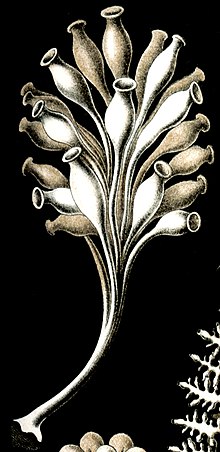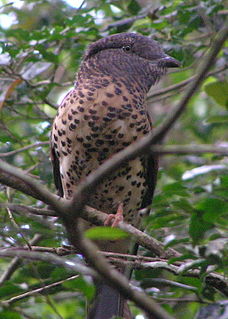
The cuckoo-roller or courol is the only bird in the family Leptosomidae, which was previously often placed in the order Coraciiformes but is now placed in its own order Leptosomiformes. The cuckoo-roller is at the root of a group that contains the Trogoniformes, Bucerotiformes, Piciformes, and Coraciiformes.

The graceful prinia is a small warbler. This prinia is a resident breeder in northeastern Africa and southern Asia, from Egypt and Somalia east to Saudi Arabia, where it is sometimes called streaked wren-warbler.
Gracilis, a Latin adjective meaning slender, graceful or gracile, may refer to :

Nepenthes gracilis, or the slender pitcher-plant, is a common lowland pitcher plant that is widespread in the Sunda region. It has been recorded from Borneo, Cambodia, Peninsular Malaysia, Singapore, Sulawesi, Sumatra, and Thailand. The species has a wide altitudinal distribution of 0 to 1100 m above sea level, although most populations are found below 100 m and plants are rare above 1000 m. Despite being a widespread plant, natural hybrids between N. gracilis and other species are quite rare.
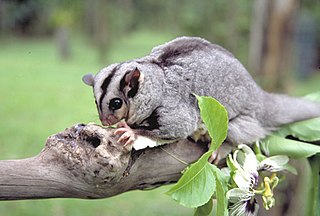
The mahogany glider is an endangered gliding possum native to a small region of coastal Queensland in Australia.

Smilodectes is a genus of adapiform primate that lived in North America during the middle Eocene. It possesses a post-orbital bar and grasping thumbs and toes. Smilodectes has a small cranium size and the foramen magnum was located at the back of the skull, on the occipital bone.

Vasconcellea is a genus with 20 or 26 species of flowering plants in the family Caricaceae. Most were formerly treated in the genus Carica, but have been split out on genetic evidence. The genus name has also been spelled "Vasconcella".

The western spotted skunk is a spotted skunk of western North America.

The slender yellow bat is a species of vesper bat. It is found only in Mexico. It ranges from Jalisco and Zacatecas to Oaxaca states, where it has been found in pine and pine-oak forests, tropical dry forest, and dry shrublands from 600 to 2,000 meters elevation.
The slender harvest mouse(Reithrodontomys gracilis) is a species of rodent in the family Cricetidae. A small mouse-like rodent distributed throughout a portion Central America.

The Talamancan small-eared shrew is a species of mammal in the family Soricidae. It is found in Costa Rica and Panama.
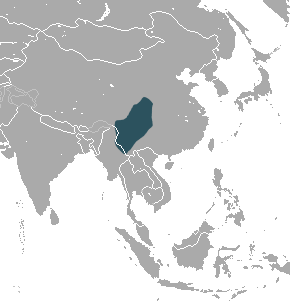
The gracile shrew mole is a species of mammal in the family Talpidae. It is endemic to China; populations known from Myanmar likely represent other species.
Wendlandiella is a genus of one species of palms found in Peru, Bolivia and Acre state in Brazil. The genus is named after Hermann Wendland.
Citrus gracilis, the Humpty Doo lime or Kakadu lime, is a straggly shrub endemic to eucalypt savannah woodlands of Northern Territory, Australia.
Ernstia laxa is a species of calcareous sponge in the family Clathrinidae found in New Zealand. The species name is derived from Latin meaning "wide".
Ernstia minoricensis is a species of calcareous sponge in the family Clathrinidae found in Spain. The species is named after the island of Menorca where the type specimen was discovered.
Ernstia quadriradiata is a species of calcareous sponge from Brazil.
Gracility is slenderness, the condition of being gracile, which means slender. It derives from the Latin adjective gracilis, or gracile (neuter), which in either form means slender, and when transferred for example to discourse takes the sense of "without ornament", "simple" or various similar connotations.
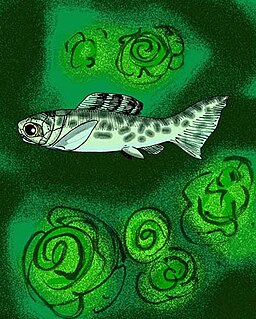
Microsteus is an extinct genus of small selenosteid arthrodire placoderms known from the Upper Frasnian Kellwasserkalk facies of Late Devonian Germany.

Ernstia is a genus of calcareous sponges in the family Clathrinidae. The genus was erected in 2013 to contain five species previously assigned to Clathrina. The genus name honors German naturalist Ernst Haeckel for his contributions towards sponge taxonomy and phylogeny.
